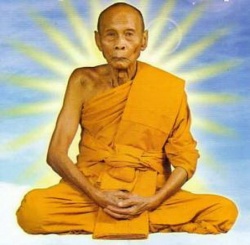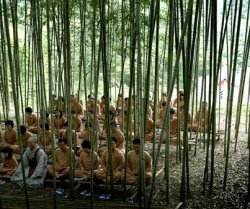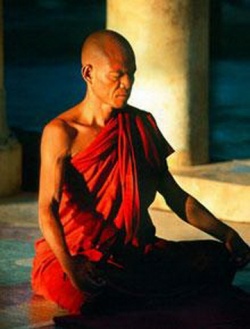Manual of Vinaya - Reading Six: Taking and Keeping the Vows
The following selection consists of the last major section of Daymaker (Nyinbyed), composed by Master Ngulchu Dharma Bhadra (1772-1851) as a commentary to the Essence of the Ocean of Discipline (‘Dul-ba rgya-mtso’i snyingpo), a summary of the vinaya teachings by Je Tsongkapa (1357-1419).
WHO CAN TAKE THE VOWS
The fourth category is an explanation of the kinds of people who can take the individual freedom vows.
The root text at this point says:
The eight types of individual freedom
Can be taken by males or females
On three continents of Dzambu and the rest,
But not on Terrible Sound. Not by the impotent,
Neuters, hermaphrodites, or the like.
1 These five types are explained as follows: A “neuter from birth” is someone who from birth was from birth neither a man nor a woman. A “half-month neuter” is someone who turns into a woman for half the month, and into a man for the other half of the month. A “contact neuter” is someone whose sexual organ comes out only when embraced by another. A “jealousy neuter” is someone whose sexual organ comes out only when seeing others in sexual contact, or by seeing another’s sexual organ and being jealous of it. A “neuter by castration” is someone who has lost their sexual organ because
Those eight types of individual freedom vows which I explained above can be taken by people, male or female, who live on the three continents of Dzambu, Greatbody and Cattleusers, but not by those who live on the northern continent of Terrible Sound, or on one of the two subcontinents related to this continent. The vows cannot be taken by the following types of beings:
those who are impotent in the sense of being unable to have sexual relations;
neuters, which includes five kinds of “male” neuters (neuters from birth, half-month neuters, contact neuters, jealousy neuters, and neuters by castration)1 and five kinds of “female” neuters (hermaphroditic neuters,
2 These five types of “female” neuters are explained as follows. An “hermaphroditic neuter” is a predominately female hermaphrodite with both male and female sexual organs. A “neuter by connection” is a woman suffering from a disease where the sexual organ and anus are interconnected. A “neuter who is always menstruating” refers to a woman who is constantly menstruating. A “neuter who never menstruates” is a woman who is not menstruating at all. An “infertile neuter” is a woman who has the female sexual organ but not the female sexual energy.
neuters by connection, neuters who are always menstruating, neuters who never menstruate, and infertile neuters);2
as well as hermaphrodites, who possess both male and female sexual organs.
Neither can vows be taken by persons who have committed an immediate misdeed, by those who are impostors attempting to learn about the tradition for their own reasons, by persons who hold wrong views, or anyone of the like.
HOW THE VOWS ARE LOST
The fifth category covers the things that can make you lose these vows. It has two sections: the actual explanation of what makes you lose your vows, and an explanation of the beliefs of our own Buddhist schools concerning this. The first of these has two parts of its own: an explanation of the “shared” causes which would make you lose any of the eight types of individualfreedom vows, and then an explanation of the unique causes which would make you lose certain ones of these vows.
The first of the two is covered in the following lines of the root text:
The causes for losing your vows are two.
Those shared are returning, dying and moving,
Both organs appearing, changing three times,
And cutting the very root of virtue.
The two causes for losing your vows are the shared causes for losing any of the eight types of individual freedom vows, and the unique causes for losing certain ones of them. The shared causes for losing any of the vows are the following:
returning your vows by pronouncing the words of the ritual for returning them, where you say “I give back my vows…” and so on in the presence of a fully-ordained monk or the like;
dying and moving on to your next birth;
having both male and female sexual organs appear on you
simultaneously;
changing sexes three times;
or cutting the very root of your virtue by holding wrong views.
The unique causes for losing certain ones of the vows are explained in these lines:
Finding out that you’re not twenty,
Agreeing to have, and the end of a day;
These the respective unique for full monks
And nuns, intermediate nuns, and one-day.
The unique causes for losing the vows of a fully-ordained monk, an intermediate nun, and a one-day vow are, respectively, the following three:
not being twenty years old when you took full monk’s vows, but
thinking you were as you did, and then later finding out that you weren’t twenty, while you’re still not twenty (here the time spent in the womb is included in the twenty);
agreeing to have sex with a man;
and the ending of a day (that is, one 24-hour period), which is the amount
of time that you committed to keep the vow.
The second section, an explanation of the beliefs of the our own Buddhist school concerning how the vows are lost, is expressed in the following lines of the root text:
Some assert that you lose your vows
If a root downfall occurs or if
The holy teachings decline.
The Kashmiri Detailists say that when
A person with vows has a root downfall,
He’s like someone wealthy with a debt.
Those of the Sutrist school of Buddhism, the one section of the Detailist school known as “Under the Sun,” and some other Buddhist groups as well assert that if any one of the four root downfalls occurs, you lose your vows.
Some others, including the “Red-Robed Ones” (one section of the eighteen in the Listener school) assert that you lose your vows if the holy teachings of the Buddha decline in the world.
Those of the Kashmiri section of the Detailists though don’t agree that committing a root downfall causes you to lose your vows. They say that when a person like a fully-ordained monk with proper individual-freedom vows has committed one of the root downfalls like killing, he is immoral from the point of view of not stopping himself from killing, but still moral in the sense of stopping himself from stealing and the like.
They say thus that he’s like someone wealthy with a debt. From the point of view of having a debt, he is poor, but from the point of view of having wealth, he is rich. The Asanga brothers, among others, do not agree that you lose your vows if the holy teachings of the Buddha happen to decline in the world. Their position is that even if the Buddhist teachings were to do so, those who did not already have vows could not get new ones, but those who did already had vows would not lose them.
BENEFITS OF KEEPING YOUR VOWS
The sixth category concerns the benefits you get from keeping the individual vows. This will be explained in two sections: the actual explanation of the benefits of keeping the vows of individual freedom, and some encouragement to keep the vows which possess these benefits.
The first of these two is expressed in the following verse of the root text:
It is stated that, from keeping these vows,
One attains the temporal result of birth
As a pleasure being or human; and as
An ultimate result three enlightenments.
Many times, throughout all of the open and secret teachings of the Buddha and their commentaries, it is stated that if one keeps properly the eight types of individual freedom vows which I have just described, then he or she attains the temporal result of a higher birth as a pleasure being or human, as well as the ultimate result of “definite good”—which refers to one of the three kinds of enlightenment: the enlightenment of the listener, the enlightenment of the Self-Made Buddhas, and the unsurpassable state of total Enlightenment. In particular, the text known as Entering the Middle Way states:
There’s no other cause than the ethical life for the definite good,
And higher rebirths, of ordinary beings, and those born from speech,
And those individuals who are committed to self-made Buddhahood,
And finally those who are the princes of the victorious Buddhas.
The encouragement on keeping the vows that have these benefits is expressed in the root text with the lines that follow next:
Therefore those of you willing to make effort
Should in respect and always strive to keep them.
The benefits thus have been described as limitless; therefore, for this reason, those of you who are willing to make an effort (which means, those of you who wish to give some meaning to the spiritual leisures and fortunes you’ve found) should put forth two kinds of effort where you always strive, and strive with feelings of respect, to keep these vows: cherish them as you do your own life, and then give it all your strength.
THE CONCLUSION
The conclusion of my commentary covers two points: the dedication of the merit of composing the root text, and finally the colophon.
THE DEDICATION OF MERIT In the root text the dedication is found in the following pair of lines:
By the virtue of what I’ve just done may every
Living creature abide forever in pure activity.
Here Je Tsongkapa dedicates whatever amount of virtue he may have gained by composing this treatise, the one known as the Essence of the Ocean of Discipline. He dedicates this virtue to every living creature, to a number of beings as infinite as the extent of space itself:
From this moment on, always, may every living creature achieve a life of leisure and opportunity. May they then enter the door of the Buddha’s teachings, and abide in the faultless morality of pure activity. And may they thus attain, with speed, the state of the
Omniscient Victors!
THE COLOPHON
The colophon to Je Tsongkapa’s text reads as follows:
This completes the Briefer Essence of the Ocean of Discipline, a presentation
of the vows of individual freedom by that master of poetics, the glorious
Tsongkapa of the East, otherwise known as Lobsang Drakpa, who took his birth in the very farthest reaches of the Land of Snow.
Here I shall give a detailed explanation of the colophon. In the Tibetan text, the word che (the expression “this completes” in English) is used to indicate the end of the body of the text. The literal meaning of the phrase “vows of individual freedom” has already been covered above.
This has been a presentation: a treatise which presents in full—either directly or indirectly, as the subject may require—how one attains these vows if they have yet to be attained; how one keeps them from being damaged in the case that they have already been attained; and how one restores them should they happen to be damaged. It is an eloquent and unprecedented study of the subject, and it has a very special name.
The word “discipline” in the title of this text has a particular meaning. The subject matter of the section of the canon which treats discipline is that morality which involves giving up the seven actions, along with what is associated with them. This morality “disciplines” or tames the mental afflictions, and also acts to “discipline” or control the senses. This then is why the subject is known as “discipline.”
This same section of the canon, the section on discipline, has moreover been described as follows in the Sutra on the Vows of Individual Freedom:
That thing called individual freedom
Is the essence and heart which allows the entire
Bottomless, shoreless snow-water lake
Of the Buddha’s discipline to remain.
The depth and breath of the great ocean is difficult to fathom; just so, the rules of the holy teachings on discipline—the requirements, allowances, exceptions, and so on—have also a depth and breadth which can only be grasped with difficulty. And just as the ocean is the ultimate source of all jewels, the code of discipline is the ultimate source of all the good qualities of higher births and definite good. It is for this reason that we call this text the ocean.
The most extraordinary, essential object within the ocean is that precious jewel which grants every wish, and in the same way the most extraordinary, essential core of the teachings on discipline consists of the vows of individual freedom. Here too in his treatise Je Tsongkapa has treated the vows as the very essence, purposely highlighting and explaining them.
North of the “Seat of the Diamond” (Vajrasana, the site of the Buddha's enlightenment), which is located in the Land of the Realized Ones [that is, India), lies the country known as the “Snowy Land.” In the “upper” part of this country are the three states we call Ngari; in the country’s center are the four provinces of U-tsang, and in the “lower” part we find the three highlands of Dokam.
Je Tsongkapa took his birth in the very farthest reaches of the eastern part of the Land of Snow; that is, in the section of the three highlands of Dokam known as the “Highlands of Tsongka,” so called because the Tsongka river flows through this area.
See also
- Manual of Vinaya - Reading One: Je Tsongkapa’s Epistle on Ethics
- Manual of Vinaya - Reading Two: Outline of the Sutra on Discipline (Vinaya Sutra)
- Manual of Vinaya - Reading Three: Introduction to the Vows of Individual Freedom
- Manual of Vinaya - Reading Four: A General Description of the Vows, Part One
- Manual of Vinaya - Reading Five: A General Description of the Vows, Part Two
- Manual of Vinaya - Reading Six: Taking and Keeping the Vows
- Manual of Vinaya - Reading Seven: The Ten Non-Virtues, and their Karmic Results
- Manual of Vinaya - Reading Eight: Introduction to the Steps of the Path
- Manual of Vinaya - Reading Nine: Description of the Lesser Capacity
- Manual of Vinaya - Reading Ten: Description of the Medium and Greater Capacities
- Manual of Vinaya - CLASS NOTES part 1
- Manual of Vinaya - CLASS NOTES part 2



